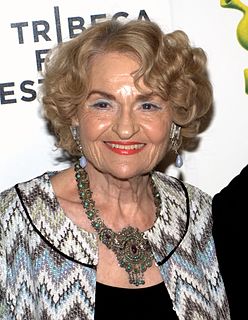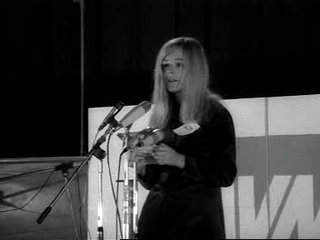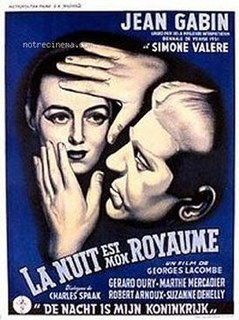Related Research Articles
Kim Longinotto is a British documentary film maker, well known for making films that highlight the plight of female victims of oppression or discrimination. Longinotto has made more than 20 films, usually featuring inspiring women and girls at their core. Her subjects have included female genital mutilation in Kenya, women standing up to rapists in India, and the story of Salma, an Indian Muslim woman who smuggled poetry out to the world while locked up by her family for decades.

Molly Clark Haskell is an American feminist film critic and author. She contributed to The Village Voice—first as a theatre critic, then as a movie reviewer—and from there moved on to New York magazine and Vogue. Her most influential book is From Reverence to Rape: The Treatment of Women in the Movies. She co-hosted Turner Classic Movies' The Essentials with Robert Osborne in 2006 for one season.

Perry Miller Adato was an American documentary film producer and director and writer. Adato was born Lillian Perry Miller in Yonkers, New York. At age 18 she moved to Greenwich Village. She married Neil M. Adato on September 11, 1955. They had two children, Lauren and Michelle.
The Jane Collective or Jane, officially known as the Abortion Counseling Service of Women's Liberation, was an underground service in Chicago, Illinois affiliated with the Chicago Women's Liberation Union that operated from 1969 to 1973, a time when abortion was illegal in most of the United States. The foundation of the organization was laid when Heather Booth helped her friend's sister obtain a safe abortion in 1965. Other women with unwanted pregnancies began to contact Booth after learning via word-of-mouth that she could help them. When the workload became more than what she could manage, she reached out to other activists in the women's liberation movement. The collective sought to address the increasing number of unsafe abortions being performed by untrained providers. Since illegal abortions were not only dangerous but very expensive, the founding members of the collective believed that they could provide women with safer and more affordable access to abortions.
Peter Krieg, born as Wilhelm Walter Gladitz was a documentary filmmaker, producer and writer. He initially enrolled in business and economics courses at Hamburg University but abandoned his studies to travel and teach horsemanship in Lebanon and Saudi Arabia. He later returned to Germany with his first wife, the American Heidi Knott, with whom he studied film at the German Film & TV Academy (DFFB) in Berlin and collaborated on his early works.
Marina Yevseevna Goldovskaya is a Russian-American documentary cinematographer famed for her candid portrayal of people. She has documented many types of people including simple folk, seamstresses, a female astronaut, literary and artistic legends, as well as political leaders. She was the winner of USSR State Prize (1988).
Merata Mita was a notable filmmaker in New Zealand as well as a key figure in the growth of the Māori screen industry. She was from the Māori iwi of Ngāti Pikiao and Ngāi Te Rangi.

Feminism in the Netherlands began as part of the first-wave feminism movement during the 19th century. Later, the struggles of second-wave feminism in the Netherlands mirrored developments in the women's rights movement in other Western countries. Women in the Netherlands still have an open discussion about how to improve remaining imbalances and injustices they face as women.
Abel Jacquin (1893–1968) was a French actor who appeared in more than thirty films between 1930 and 1956. Jacquin co-directed the 1933 comedy film Les deux 'Monsieur' de Madame. He was also noted for his narration of the 1933 documentary Land Without Bread.
The Royal Tour of the Caribbean is a 1966 documentary film, produced by the Colonial Office to record the royal visit of Elizabeth II to the Crown Colonies of the Caribbean.

Up the Junction is an episode of the BBC anthology drama series The Wednesday Play directed by Ken Loach, produced by James MacTaggart, and first broadcast on 3 November 1965 on BBC 1. The play was adapted by Nell Dunn and (uncredited) Ken Loach from Dunn's short story collection of the same name. It tells the stories of three young women living in North Battersea and Clapham and, to a lesser degree, their boyfriends.
Robin Anderson (1950-2002) was an Australian award-winning documentary filmmaker.

Ravayat-e Fath, variously translated as The Chronicles of Victory, The Tales of Victory, The Narrative of Victory, The Narration of Victory, The Story of Victory, and Witness to Glory, was a war documentary television series directed by Morteza Avini and filmed on the front lines of the Iran–Iraq War of the 1980s. It is one of the most famous works of Avini, and one of the first and most important war documentary films in the history of Iranian cinema. The series presents witnessing discourse through footage of front-line sacrifices set against commentary by Avini. The documentary film "literally brought the details of war into people's living rooms every night". The series had a mystic and spiritual theme.

The Night Is My Kingdom is a 1951 French drama film directed by Georges Lacombe and starring Jean Gabin, Simone Valère and Gérard Oury. Gabin was awarded the Volpi Cup for Best Actor at the 1951 Venice Film Festival.
Youth is a 1934 French drama film directed by Georges Lacombe and starring Robert Arnoux, Lisette Lanvin and Jean Servais.

Heather Booth is an American civil rights activist, feminist, and political strategist who has been involved in activism for progressive causes. During her student years, she was active in both the civil rights movement and feminist causes. Since then she has had a career involving feminism, community organization, and progressive politics.
Andrea Weiss is an American independent documentary filmmaker, author, and professor of film/video at the City College of New York where she co-directs the MFA Program in Film. She was the archival research director for the documentary Before Stonewall: The Making of a Gay and Lesbian Community (1984), for which she won a News & Documentary Emmy Award.
For Love or Money is a 1983 documentary which investigates role of Australian women for over 200 years in both paid and unpaid work. It is compiled using almost entirely historical material.
Jeni Thornley is an Australian feminist documentary filmmaker, writer, film valuer and research associate at University of Technology, Sydney. Since leaving her job as Manager of the Women's Film Fund at the Australian Film Commission in 1986, Thornley has worked as an independent writer, director and producer at Anandi Films. She has fulfilled teaching roles at UTS and the Australian School for Film and Television. Thornley is currently an Honorary Research Associate in the Faculty of Arts and Social Sciences at UTS. She is also a consultant film valuer for the Cultural Gifts Program, Dept of Communications and the Arts.
Women in documentary film describes the role of women as directors, writers, performers, producers, and other film industry professions. According to a 2017 study by San Diego University's Center for the Study of Women in Television and Film, women make up around thirty percent of the population of people working in the documentary film industry, worldwide. In a separate study on the employment of women in indie films, the Center found that overall fewer woman directed independent films were screened at film festivals but that a higher percentage of woman directed documentary films were screened, at 8 films versus 13 documentary films directed by men. In an October 2015 Annenberg study, women documentarians in countries other than the U.S. were 40 percent likely to be “helmers” as opposed to 30 percent likely in the U.S. The study counted films with multiple countries involved “as other countries” but if the U.S. was involved it wasn't counted as “other countries.”
References
- ↑ Aitken, Ian (2013-10-18). Encyclopedia of the Documentary Film 3-Volume Set. Routledge. ISBN 9781135206208.
- ↑ Aitken, Ian (2013-10-18). Encyclopedia of the Documentary Film 3-Volume Set. Routledge. ISBN 9781135206208.
- ↑ Womensfilmandtelevisionhistory (2014-04-04). "Becoming Sheffield Film Co-op". Women's Film and Television History Network-UK/Ireland. Retrieved 2016-07-02.
- ↑ Aitken, Ian (2013-10-18). Encyclopedia of the Documentary Film 3-Volume Set. Routledge. ISBN 9781135206208.
- ↑ Womensfilmandtelevisionhistory (2014-04-11). "Sheffield Film Co-op: Beginning, Being and Ending". Women's Film and Television History Network-UK/Ireland. Retrieved 2016-07-02.
| This article about a British film distributor or production company is a stub. You can help Wikipedia by expanding it. |